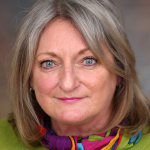Think Globally – Act Globally
The Canadian Teachers’ Federation (CTF-FCE) and its Member organizations have made safety in schools a priority. Likewise, Ministries of Education in most, if not all, provinces and territories have invested in curricula and professional learning to promote “safe and caring schools”. Here at home, policies, protocols and programs have been developed to ensure that our places of learning are as much as possible free from the threat of harm. Many of the articles in this issue of Perspectives highlight the important work being done and the great strides being made here in Canada towards that goal. What is less known is that the CTF-FCE, through its International and Social Justice Program, is also actively promoting the concept of safe school spaces around the globe in the work we do with our international partners.
While there are still issues here in Canada—and technology has added new challenges to the safety of students, teachers and others in our schools—the threats in many countries we work with are almost unimagineable. Human dignity and the very right to an education are compromised by the physical, social and psychological environments students encounter en route to and in school.
One study indicated that almost 78 per cent of children in primary school in Uganda report having experienced sexual abuse at school. Girls in Ugandan schools are frequently subjected to gender-based violence and defilement. This, along with the lack of sanitation facilities, clearly illustrates that schools are certainly not safe spaces for girls in that country. The Teachers’ Action for Girls (TAG) program, initiated in 2003 by the CTF-FCE with the Ugandan National Teachers’ Union (UNATU), was selected by the United Nations as an example of good practice in promoting girls’ education. A significant part of the TAG program was to train teachers to be protectors and to train girls to be self-advocates. The program is having an impact, and in schools where teachers have been trained and the TAG program has been implemented, indicators are showing that more girls are attending on a regular basis as these schools are now safer for them. The principles of the TAG program have also been adopted by the Fédération des Syndicats de l’Éducation Nationale (FESEN) in Togo as our partner unions shared their stories through the African regional network and Education International.
In Sierra Leone, Teachers’ Action for Peace projects focus on creating peaceful schools within the context of their communities. In this post-war environment, school children have grown up surrounded by conflict. For these students, corporal punishment and physical and mental abuse is perceived as the norm. Teachers’ Action for Peace therefore began with the very basics—teaching children about peace. Modules were developed on the nature of peace, violence prevention, conflict resolution, communication, human rights, and gender. The CTF-FCE worked with our partner, the Sierra Leone Teachers’ Union (SLTU), on the module development and helped to facilitate workshops for teachers and to mobilize communities to create safer, more caring, more peaceful school environments.
In addition to these special projects, each summer as part of Project Overseas (PO), Canadian teachers, sponsored by our Member organizations and coordinated by the CTF-FCE with our partners, offer professional development in multiple countries in Africa and the Caribbean. While PO projects are primarily curriculum based in service, a major focus is on pedagogy which is child centered and supportive of diversity in all its forms—helping to create safe spaces and caring places for learning.
While the old adage “Think globally, act locally” has merit, the CTF-FCE goes one step further—to think and act both locally and globally.
If you would like to learn more about CTF-FCE’s international and social justice programs, please contact us or click here for more info.

Beverley Park is a program officer for the International and Social Justice Program at the CTF-FCE.


